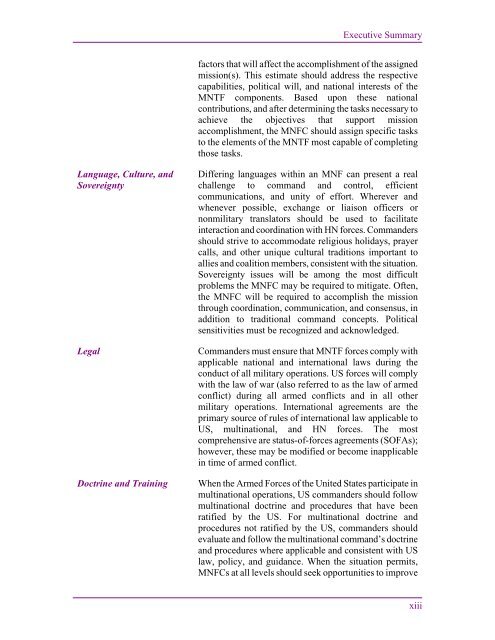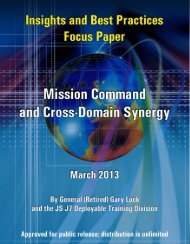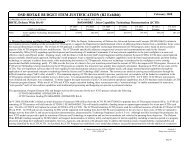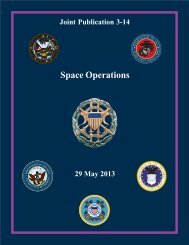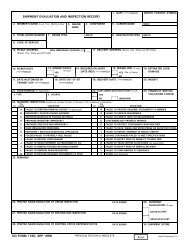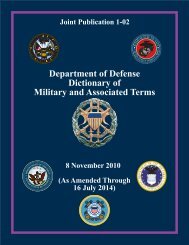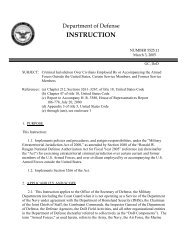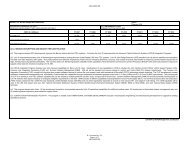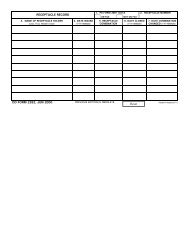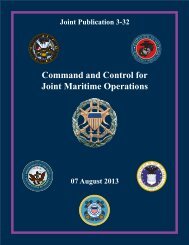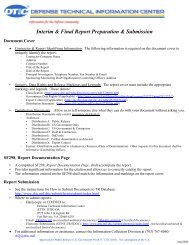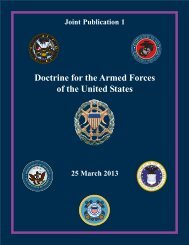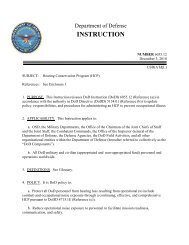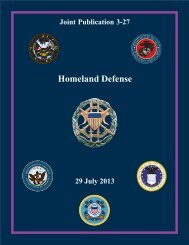JP 3-16, Multinational Operations - Defense Technical Information ...
JP 3-16, Multinational Operations - Defense Technical Information ...
JP 3-16, Multinational Operations - Defense Technical Information ...
Create successful ePaper yourself
Turn your PDF publications into a flip-book with our unique Google optimized e-Paper software.
Executive Summary<br />
factors that will affect the accomplishment of the assigned<br />
mission(s). This estimate should address the respective<br />
capabilities, political will, and national interests of the<br />
MNTF components. Based upon these national<br />
contributions, and after determining the tasks necessary to<br />
achieve the objectives that support mission<br />
accomplishment, the MNFC should assign specific tasks<br />
to the elements of the MNTF most capable of completing<br />
those tasks.<br />
Language, Culture, and<br />
Sovereignty<br />
Legal<br />
Doctrine and Training<br />
Differing languages within an MNF can present a real<br />
challenge to command and control, efficient<br />
communications, and unity of effort. Wherever and<br />
whenever possible, exchange or liaison officers or<br />
nonmilitary translators should be used to facilitate<br />
interaction and coordination with HN forces. Commanders<br />
should strive to accommodate religious holidays, prayer<br />
calls, and other unique cultural traditions important to<br />
allies and coalition members, consistent with the situation.<br />
Sovereignty issues will be among the most difficult<br />
problems the MNFC may be required to mitigate. Often,<br />
the MNFC will be required to accomplish the mission<br />
through coordination, communication, and consensus, in<br />
addition to traditional command concepts. Political<br />
sensitivities must be recognized and acknowledged.<br />
Commanders must ensure that MNTF forces comply with<br />
applicable national and international laws during the<br />
conduct of all military operations. US forces will comply<br />
with the law of war (also referred to as the law of armed<br />
conflict) during all armed conflicts and in all other<br />
military operations. International agreements are the<br />
primary source of rules of international law applicable to<br />
US, multinational, and HN forces. The most<br />
comprehensive are status-of-forces agreements (SOFAs);<br />
however, these may be modified or become inapplicable<br />
in time of armed conflict.<br />
When the Armed Forces of the United States participate in<br />
multinational operations, US commanders should follow<br />
multinational doctrine and procedures that have been<br />
ratified by the US. For multinational doctrine and<br />
procedures not ratified by the US, commanders should<br />
evaluate and follow the multinational command’s doctrine<br />
and procedures where applicable and consistent with US<br />
law, policy, and guidance. When the situation permits,<br />
MNFCs at all levels should seek opportunities to improve<br />
xiii


